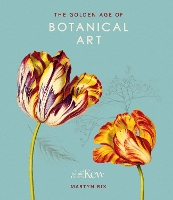


|
|
| book details |
The Golden Age of Botanical Art: Royal Botanic Gardens, Kew
By (author) Martyn Rix

|
| on special |
normal price: R 455.95
Price: R 432.95
|
| book description |
Kew: Golden Age of Botanical Art brings together the stories of the intrepid explorers - some of whom became botanical artists by default - and the many professional artists who recorded the flora that they discovered on their travels and expeditions. From some of the earliest attempts at art to the plant hunters of the nineteenth and twentieth centuries, the images produced in the study of plants have held a fascination for all those who love nature. Truly global in its scope, this beautifully illustrated book moves across centuries and continents looking at the artistry of China and India, delving into the sketchbooks of explorers in the Himalayas and following the voyages of those who discovered new worlds and new species as far apart as Russia and South America. Alongside special features on key figures in the botanical art world, Kew: Golden Age of Botanical Art highlights the work of some of the great names of botanical art, including Ehret and Bauer. Included within is a host of rarely published and previously unpublished images from the Royal Botanical Gardens in Kew, as well as an outline on how what might have been a pastime for some also made a significant contribution to our understanding of the world and the glories of nature.
| product details |

Normally shipped |
Publisher | Headline Publishing Group
Published date | 8 Mar 2018
Language |
Format | Hardback
Pages | 256
Dimensions | 286 x 252 x 24mm (L x W x H)
Weight | 1500g
ISBN | 978-0-2330-0542-3
Readership Age |
BISAC | art / subjects & themes / plants & animals
| other options |

Normally shipped |
Readership Age |
Normal Price | R 1 097.95
Price | R 1 043.95
| on special |

Normally shipped |
Readership Age |
Normal Price | R 1 188.95
Price | R 1 128.95
| on special |
|
|
|
To view the items in your trolley please sign in.
| sign in |
|
|
|
| specials |
|
|
An epic love story with the pulse of a thriller that asks: what would you risk for a second chance at first love?
|

|
Mason Coile
Paperback / softback
224 pages
was: R 542.95
now: R 488.95
|
A terrifying locked-room mystery set in a remote outpost on Mars.
|
|
|
|
|